|
|
|
Sort Order |
|
|
|
Items / Page
|
|
|
|
|
|
|
| Srl | Item |
| 1 |
ID:
106143
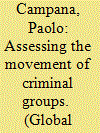

|
|
|
|
|
| Publication |
2011.
|
| Summary/Abstract |
The article offers a commentary on the push and pull framework outlined by Morselli, Turcotte and Tenti in the current issue of this journal. It argues that, when assessing the mobility of criminal groups, two key aspects deserve better recognition: first, the nature of the movement, namely whether the common fund and the 'headquarters' (including the boss) have been shifted from the old to the new locale; second, whether the group provides some kind of goods and services or is purely predatory. It maintains that both push and pull factors may vary according to those characteristics. Finally, the article empirically examines the movement of a Camorra crime group from Campania (Italy) to Scotland and the Netherlands, and reconstructs the underlying push and pull factors.
|
|
|
|
|
|
|
|
|
|
|
|
|
|
|
|
| 2 |
ID:
179944
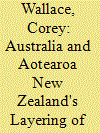

|
|
|
|
|
| Summary/Abstract |
Around 2016, the Australian and Aotearoa New Zealand governments began to disassemble the coherent and optimistic imagery that had hitherto signaled their strategic commitment to accommodating China within an interdependent, prosperous, and strategically stable Asia-Pacific. While Canberra and Wellington remain committed to constructive "bedrock" bilateral relations and still avoid explicitly positioning China as a direct threat in their strategic messaging, both governments have increasingly communicated (1) concerns about their strategic vulnerability and military insecurity that requires enhanced military potency; (2) pessimism that great power competition could disrupt Asia-Pacific stability, requiring strategic diversification and cross-bracing with "Indo-Pacific" partners; and (3) stronger official criticism on narrower, strategically circumscribed issue sets as the two nations attempt to set acceptable terms for anticipated relations of greater future complexity with China. The targets of this "layered" approach to strategic communications are not only Beijing and Washington, DC, but increasingly other important regional partners and domestic stakeholder audiences with diverse interests.
|
|
|
|
|
|
|
|
|
|
|
|
|
|
|
|
| 3 |
ID:
139278
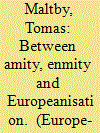

|
|
|
|
|
| Summary/Abstract |
Considering the development of the Bulgarian energy security strategy this article analyses how the country has adapted to EU membership and to energy security challenges, such as disruptions to Russian gas supplies in 2006 and 2009 and rising gas prices. Utilising a conceptual lens which synthesises Regional Security Complex Theory and Europeanisation, the article offers an explanation of energy policy changes. It concludes that conceptions of Russia as an energy security guarantor have changed since Bulgaria's EU accession and that Bulgarian energy policy has undergone a qualified reorientation away from a positive dependence on Russian energy sources, towards a convergence with EU priorities of diversification and a single energy market.
|
|
|
|
|
|
|
|
|
|
|
|
|
|
|
|
| 4 |
ID:
112500
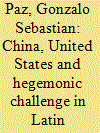

|
|
|
|
|
| Publication |
2012.
|
| Summary/Abstract |
Has China been a hegemonic challenge to the United States in Latin America in recent years? The article explores this question by setting a comparison with historical cases of instances of hegemonic challenge in Latin America, searching for similarities and differences, and looking for makers of rivalry as a way to start to distinguish perception from reality. I stress the instrumentality of framing issues, since they serve for internal mobilization and for control of allies. The article also attempts to illuminate the issue of how the United States has reacted to China's growing presence in an area historically considered within its sphere of interests, or "backyard," and about the dialogue between the United States and China about the region. It provides insights on the United States, China and Latin American countries' policy makers' thinking, collected through off-the- record interviews and closed-door debriefings.
|
|
|
|
|
|
|
|
|
|
|
|
|
|
|
|
| 5 |
ID:
092772
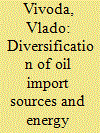

|
|
|
|
|
| Publication |
2009.
|
| Summary/Abstract |
This paper explores the relationship between the diversification of sources of imported oil and energy security of oil-importing countries. It examines the importance of diversification policy for oil importers, explains why oil importers implement oil diversification policy, and contextualizes the oil import diversification strategy in the overall energy security policy of oil importers. The paper analyzes the factors and the contexts that affect the level of importance assigned to oil import diversification policy in oil-importing countries, and the limitations that may affect the successful implication of oil import diversification policy. The examples are drawn from the world's top three oil importers, the United States, Japan, and China. The policymakers in these and other oil-importing countries place much importance on energy security. The diversification of oil import sources is used as one of the strategies to enhance energy security in oil-importing countries. This paper is important for policymakers in oil-importing countries as it provides them with a qualitative conceptual framework with which to evaluate the need to diversify their countries' sources of imported oil, and with which to identify the likely limitations to the successful implementation of oil import diversification policy.
|
|
|
|
|
|
|
|
|
|
|
|
|
|
|
|
| 6 |
ID:
167392
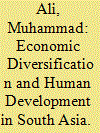

|
|
|
|
|
| Summary/Abstract |
The paper examines the effect of diversification on social welfare in South Asia using the macroeconomic data for the period 1996–2011, with export diversification as a proxy of economic diversification. In this paper, three types of diversification are assessed (i.e. related, unrelated, and overall variety). While unrelated variety and overall variety show increasing trend over the years, related variety seems to show a non-linear inverted U-shaped curve. Estimation results reveal that all three types of variety have a positive and significant relationship with human development in South Asia, which shows that diversification is beneficial for human development in South Asian countries. It is also found that the existing level of human capital significantly moderates the relationship between related variety and social welfare.
|
|
|
|
|
|
|
|
|
|
|
|
|
|
|
|
| 7 |
ID:
142631
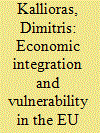

|
|
|
|
|
| Summary/Abstract |
In 2004, the EU launched the European Neighbourhood Policy (ENP), a unified policy framework towards its neighbours in the external EU periphery, aiming at strengthening prosperity, stability and security around its geopolitical borders. However, in-depth empirical analysis provides clear-cut evidence that, while the size and composition of trade flows between the EU and the ENCs may be growing, they are not favourable for the ENCs from the perspective of export diversification, in terms of either products or number of destinations. This condition increases their exposure to volatility in international markets. These results provide valuable insight into economic integration theory and for policymaking.
|
|
|
|
|
|
|
|
|
|
|
|
|
|
|
|
| 8 |
ID:
066826
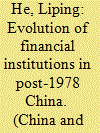

|
|
|
| 9 |
ID:
162738
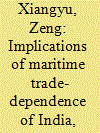

|
|
|
|
|
| Summary/Abstract |
India, China and Japan, the economic big three in Asia, is heavily dependent on maritime trade in terms of importation of energy and other natural resources in addition to import/export of manufactured products. Major economic, political and security impact has been resulted from such a dependence, as the sea-lines of communication for maritime trade across the Indian Ocean and West Pacific is vulnerable to heavy conventional/unconventional threat. Policy measures have been taken in order to mitigate the vulnerabilities. Accelerated development of maritime powers, bilateralism/multilateralism, enhanced engagement with regional players and diversification policies are among such effort. The unconventional challenges are on the decline, partly thanks to effective counter-measures, while the conventional challenges is on the rise, also partly due to the mis-match of policies from major stakeholders. The Rise of Indo-Pacific Concept and the Emerging Maritime Regionalism can be a double-edge sword. Clarification of strategic intention and effective policy dialogue is needed for a more harmonious maritime engagement among the three. Strategic vision and smart policies are needed to ensure a cooperation for the benefit of all stakeholder inclusive of the three countries in particular.
|
|
|
|
|
|
|
|
|
|
|
|
|
|
|
|
| 10 |
ID:
166573
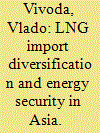

|
|
|
|
|
| Summary/Abstract |
Asia's share of global demand for natural gas has increased from 12 to 21 per cent since the turn of the century, and the overall consumption has more than doubled. At the same time, there is a widening gap between regional natural gas demand and supply, with increasing reliance on imports. In 2017, Asian importers absorbed 72 per cent of globally traded liquefied natural gas (LNG). Their LNG import dependence is forecast to grow significantly over the coming decades. This paper explores major Asian importers' approaches to LNG import diversification between 2001 and 2017 and explains why patterns of LNG imports differ across countries and over time. The focus of the paper is on five largest LNG importers in the region: China, India, Japan, South Korea and Taiwan. The paper utilises the Herfindahl-Hirschmann index (HHI) of market concentration to evaluate LNG import diversification across the five countries. The analysis contributes to a growing body of literature that evaluates various aspects of energy import diversification in the context of broader energy security strategies. Findings suggest that all countries have improved their LNG import portfolios, although there is significant temporal variation across countries. Reflecting on the relationship between energy security and growth, the paper concludes by outlining policy implications for regional energy policymakers.
|
|
|
|
|
|
|
|
|
|
|
|
|
|
|
|
| 11 |
ID:
164963
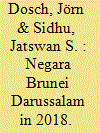

|
|
|
|
|
| Summary/Abstract |
After four years of economic gloom, the Bruneian economy began showing signs of recovery, mainly thanks to improved global oil prices and the fruits of government policies introduced three years ago. In the meantime, the sultan’s seriousness in combating corruption has taken center stage, with young new faces introduced in the recent cabinet reshuffle. Implementation of sharia law remains slow. On the international front, Brunei appears to be moving closer to China, which is emerging as the country’s largest foreign investor.
|
|
|
|
|
|
|
|
|
|
|
|
|
|
|
|
| 12 |
ID:
153093
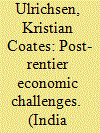

|
|
|
|
|
| Summary/Abstract |
The rentier states of the Middle East face a combination of political and economic challenges as they seek to reduce their reliance on volatile oil and gas revenues and diversify their economies. This article examines how the political economy of the six Gulf Cooperation Council (GCC) states remains heavily dependent on the hydrocarbon sector and analyses the policy responses to the fall in world oil prices since 2014. Sections in the article examine the definitional aspect of rentier state theory, nature of the redistributive welfare state that developed in the 1970s in each Gulf State, and the political aspect of economic measures that seek to reform aspects of the distinctive political economy that has underpinned socio-political and economic stability for the past five decades.
|
|
|
|
|
|
|
|
|
|
|
|
|
|
|
|
| 13 |
ID:
167042
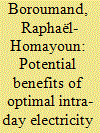

|
|
|
|
|
| Summary/Abstract |
Our article provides a better understanding of risk management strategies for all energy market stakeholders. A good knowledge of optimal risk hedging strategies is not only important for energy companies but also for regulators and policy makers in a context of climate emergency. Indeed, the electricity sector is key to achieve energy and ecological transition. Electricity companies should be on frontline of climate change struggle. Taking the perspective of electricity retailers, we analyze a range of portfolios made of forward contracts and/or power plants for specific hourly clusters based on electricity market data from the integrated German-Austrian spot market. We prove that intra-day hedging with forward contracts is sub-optimal compared to financial options and physical assets. By demonstrating the contribution of intra-day hedging with options and physical assets, we highlight the specificities of electricity markets as hourly markets with strong volatility during peak hours. By simulating optimal hedging strategies, our article proposes a range of new portfolios for electricity retailers to manage their risks and reduce their sourcing costs. A lower hedging cost enables to allocate more resources to digitalization and energy efficiency services to take into account customers’ expectations for more climate-friendly retailers. This is a virtuous circle. Retailers provide high value-added energy efficiency services so that consumers consume less. The latter contributes to reach electricity reduction targets to fight climate warming.
|
|
|
|
|
|
|
|
|
|
|
|
|
|
|
|
| 14 |
ID:
177205


|
|
|
|
|
| Summary/Abstract |
This introduction outlines how the fragmentation of the Middle East state system, coupled with the shifts in the centrality of oil to the well-being of the Global economy, has now recast debates about the very nature of energy security and the future stability of the Gulf monarchies. Acting as a primer to the articles that comprise this special section of Journal of Arabia Studies, it highlights many of the attendant security issues surrounding energy diversification strategies now being adopted by many of the regions actors, while also highlighting the key differences that have shaped the responses of the individual Gulf monarchies to the challenges they now face in an ever more uncertain era.
|
|
|
|
|
|
|
|
|
|
|
|
|
|
|
|
| 15 |
ID:
153448
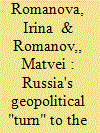

|
|
|
|
|
| Summary/Abstract |
The authors consider questions of Russia's "turn" to the East as attempts to eliminate considerable imbalance in its economic cooperation with the West and the East and the diversification of Russian foreign policy. Special attention is paid to modernization problems of existing territorial economic entities and formation of new structural links in inadequately developed regions of the Russian Far East.
|
|
|
|
|
|
|
|
|
|
|
|
|
|
|
|
| 16 |
ID:
138292
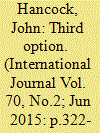

|
|
|
|
|
| Summary/Abstract |
Lately, Mitchell Sharp’s 1972 Third Option paper has acquired a new resonance—and a new readership—as Canada again finds itself worrying about dependence on the United States and revisiting dreams of new economic linkages overseas. Although the Third Option was seen at the time as a radical new call for Canadian economic and cultural independence, it was actually the latest chapter in a long-running foreign policy debate about whether Canada’s economic future lay in embracing—or resisting—the powerful pull of continentalism. This article re-examines Sharp’s Third Option initiative against that broader historical background. It argues that the Third Option, like Canada’s previous quests for economic independence, was prompted as much by fears of rising US protectionism as by concerns about eroding Canadian sovereignty. The paper also notes that the Third Option, again like past efforts at trade diversification, largely failed, and that Canada–US integration only deepened in the decade after Sharp launched his initiative. However, the long-run trend toward growing dependency on the United States may finally be reversing, and Canada’s trade and investment flows overseas are likely to increase in the decades to come. This paper argues not for a re-heated Third Option but for a fourth one instead—the simultaneous pursuit of continental and global integration.
|
|
|
|
|
|
|
|
|
|
|
|
|
|
|
|
| 17 |
ID:
141338


|
|
|
|
|
| Summary/Abstract |
Entering and surviving in export markets is a costly process that involves learning about the existence of foreign demand, ‘discovering’ production costs, building up reputation, succeeding in product branding to reduce competitive pressures and to upgrade quality to serve demanding international clients, and remaining competitive in the marketplace. This article argues that tourism alleviates some of these costs by providing an inexpensive platform for cost discovery and by acting as an accessible ‘in-house’ trade fair for domestic producers. It combines product-level data on world and Nepal’s exports with Nepalese data on tourist inflows, and macro-indicators on relative prices. For tourism-related goods, it reveals a positive association between tourist inflows from given destinations with future merchandise exports to those destinations, while no association is found for goods unrelated to tourism. The results suggest spillovers from tourism into merchandise export performance and diversification and gains from cooperation between tourism and export promotion.
|
|
|
|
|
|
|
|
|
|
|
|
|
|
|
|
| 18 |
ID:
116069
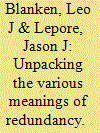

|
|
|
|
|
| Publication |
2012.
|
| Summary/Abstract |
The authors engage in the debate over waste in military force structure planning by rigorously deconstructing the concept of "redundancy." First, a typology of redundancy is constructed that provides a common framework for identifying variety among redundant structures. These are labeled "true redundancy," "expanded capacity," "portfolio diversification," and "mission overlap." Further, a number of mechanisms are identified that produce these types of structures, and show the conditions under which planners may utilize redundant structure in the search for optimization. In sum, the article provides refined concepts for analysts and planners to identify when redundancy is deleterious or beneficial.
|
|
|
|
|
|
|
|
|
|
|
|
|
|
|
|
|
|
|
|
|